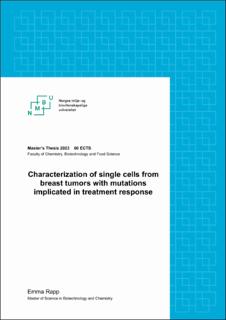| dc.description.abstract | Breast cancer has high tumor heterogeneity which can be challenging for individual patients. It is of importance to characterize the mutations in the tumors of breast cancer patients that affect the eradication of the malignant cells because of the treatment. By studying individual cells in the tumor instead of the entire tumor’s genetic material, cells of resistance at a single cell level can be identified. It is seen that the mutations which occur simultaneously in each cell, identify clones and the pseudo-times when they arise, and how these clones develop during the treatment.
In the clinical trial NeoLetExe breast cancer patients are treated neoadjuvant with Letrozole and Exemestane sequentially in the following manner: group 1 first receives Letrozole and switches to Exemestane after 2 months, and group 2 first receives Exemestane before switching to Letrozole after 2 months. Biopsies are taken before starting treatment, when changing medication and during surgery. Letrozole and Exemestane are hormone therapy drugs that are used as treatment for breast cancer in postmenopausal patients.
To study individual tumor cells, we employ a unique platform for single-cell analysis. The Mission Bio Tapestri platform is an instrument where single cells are separated and mixed with reagents to perform the analysis in isolated oil droplets, and results in specific parts of the genes being marked at a single cell level. A custom panel of 497 amplicons covering 528 sequence variants was designed in a pilot study. Tumor tissue from three patients at one timepoint (baseline), one patient with three time points (baseline, 2 months, and 4 months) and one patient with two time points (baseline and 4 months) in the NeoLetExe clinical trial was analyzed and shown in this thesis. It was discovered that some genes like ZNF717 were mutated in several or all the samples, and it was observed that clones with certain sequence variants were altered during treatment. Basic software and analysis strategies to analyze the complex data achieved with targeted single-cell sequencing is presented in this thesis, however more efficient analysis strategies should be investigated. | |
